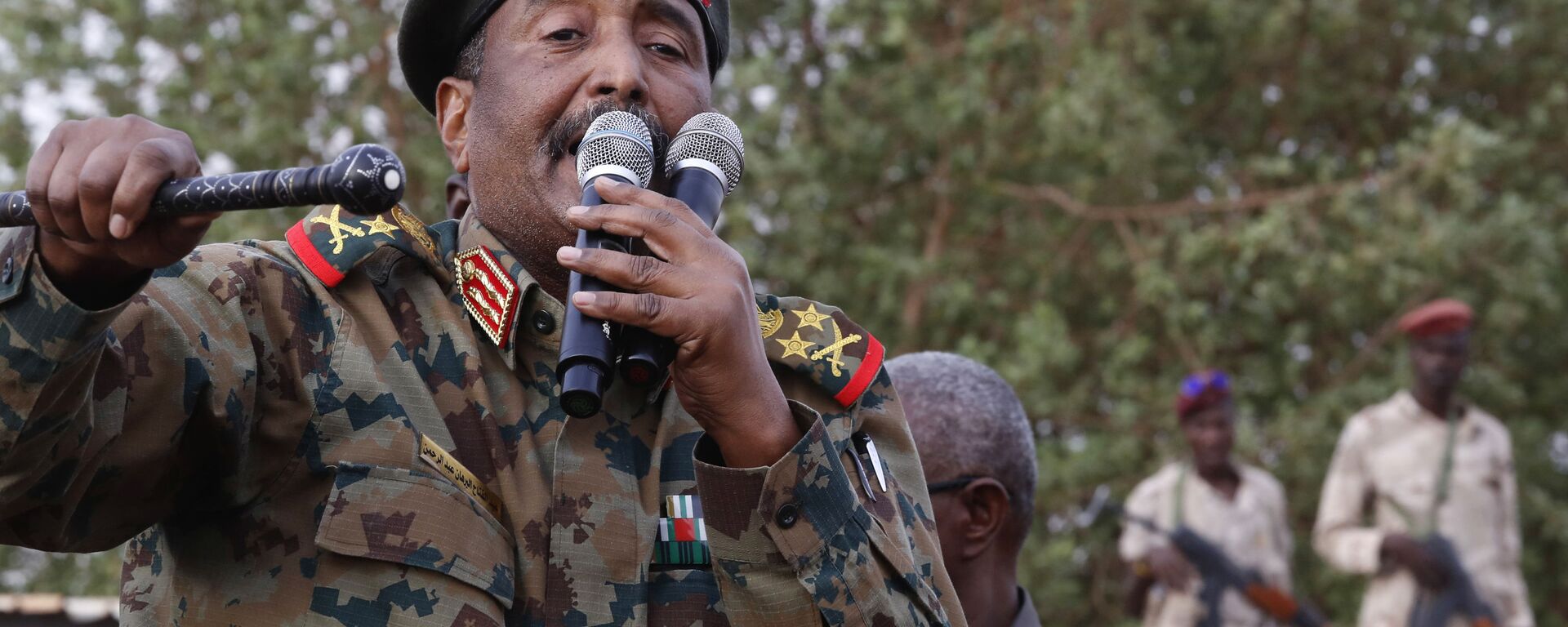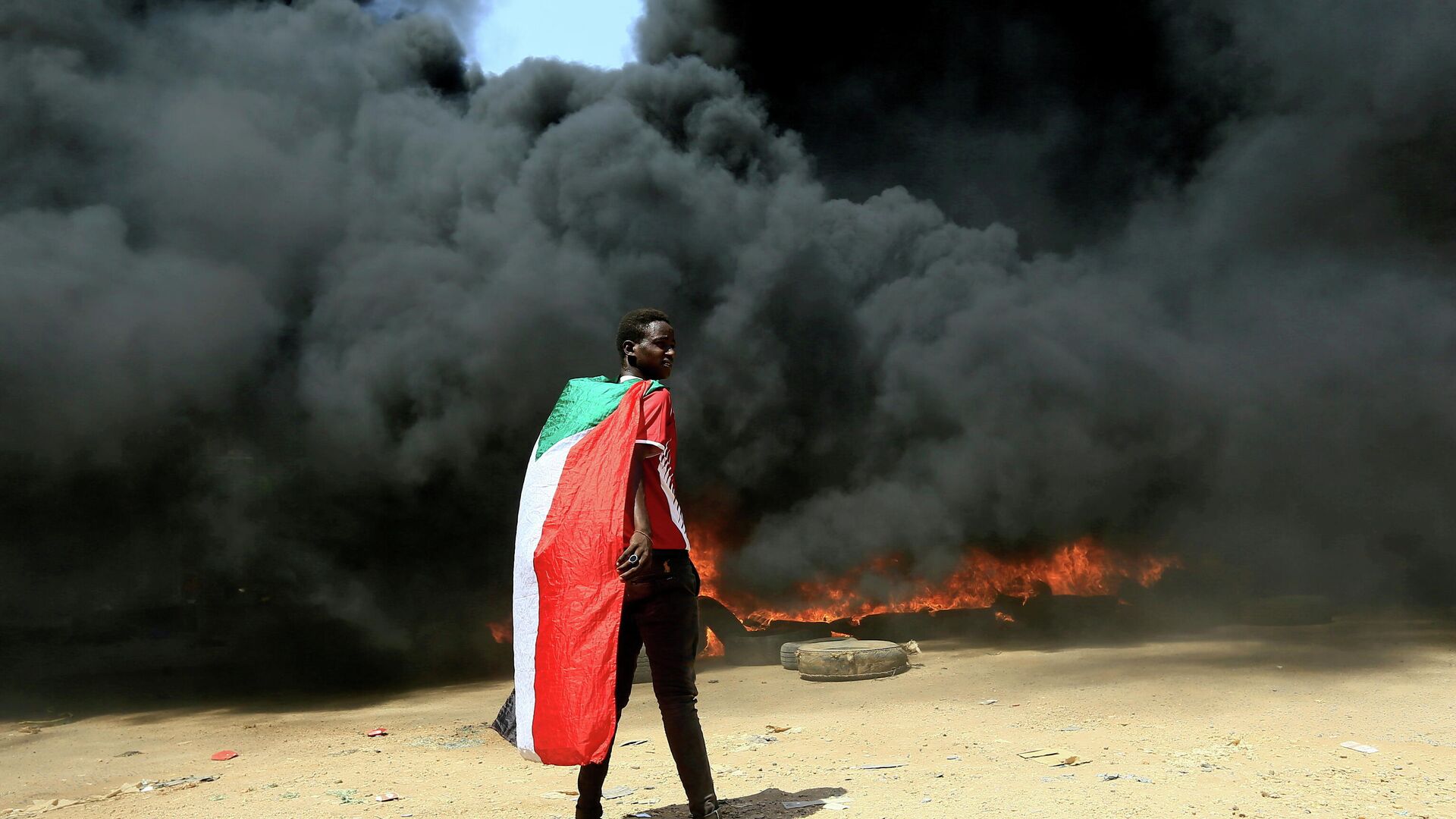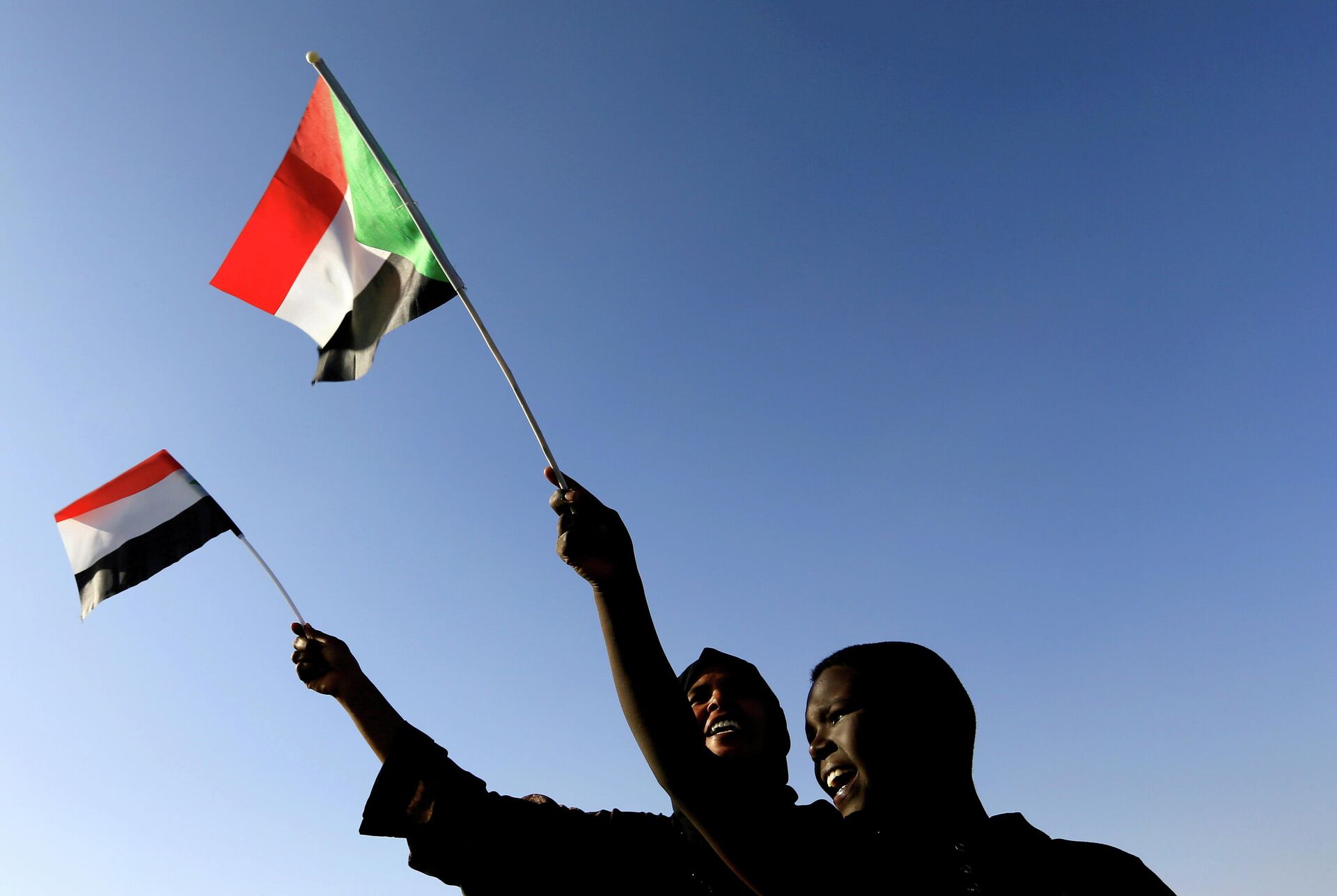https://sputnikglobe.com/20211025/what-is-known-so-far-about-military-coup-in-sudan-1090191602.html
What Is Known So Far About Military Coup in Sudan
What Is Known So Far About Military Coup in Sudan
Sputnik International
A military takeover took place in Sudan, one of the world's poorest countries, shortly before the end of General Abdel Fattah al-Burhan's tenure as head of the... 25.10.2021, Sputnik International
2021-10-25T13:59+0000
2021-10-25T13:59+0000
2024-03-09T16:32+0000
sudan
africa
military
coup
government
https://cdn1.img.sputnikglobe.com/img/07e5/0a/19/1090193012_0:161:3066:1886_1920x0_80_0_0_9989d7d8308bb1086f9f13ac802edbed.jpg
On Monday, Sudan saw what is now estimated by some in the country's transitional government to be a military coup, as the Sudanese Armed Forces detained Prime Minister Abdalla Hamdok and several other Cabinet officials after they refused to "endorse the coup". Amid the arrest of government officials, protesters have flocked the streets of the Sudanese capital Khartoum, barricading roads, setting tires on fire, and yelling chants against the military takeover.Several members of the international community have already expressed their concerns in regard to the situation in the Northeast African country. Here is a roundup of what is known about the Sudanese unrest so far.How It StartedIn the early hours of Monday, the Sudanese Information Ministry revealed that the country's Armed Forces had abducted Prime Minister Hamdok, later saying that the military had tried to force him to release a "pro-coup statement" - something that the civilian leader refused to do.Following his refusal, the military took Hamdok to an unknown location, the ministry said.Government DissolvedThe head of Sudan's Sovereignty Council, General Abdel Fattah al-Burhan, stated later on Monday that the country's transitional government had been dissolved, with the military to continue the transition on its own, as, according to al-Burhan, "what the country is going through represents a threat".He also pledged to hold elections in July 2023, citing conflicts between political groups as the reason for the military to seize control. According to the general, Sudan is still committed to "international accords" and transition to civilian rule.Concerns Around the WorldAl-Burhan's statements, however, have not brought ease of mind to members of the international community, with the United States, France, the Arab League, the United Nations, and others condemning the developments in Sudan and calling for the release of the detained officials as well as a return to civilian transition.The US Embassy in Khartoum said it was "gravely concerned" about reports of the coup, calling on the country's military to "stand down". German Foreign Minister Heiko Maas called the events "troubling" in a statement, urging "everyone in Sudan responsible for security and order to continue Sudan's transition to democracy and to respect the will of the people".The European Union insisted that the arrested Sudanese officials must be released, and "violence and bloodshed must be avoided".French President Emmanuel Macron also joined in and echoed calls to set the detained officials free. Concerns were picked up by the Arab League, with the body pointing to the importance of the commitment to an August 2019 power-sharing deal.African Union Commission chair Moussa Faki Mahamat said that the Sudanese military and civilians have to resume dialogue.Protests in KhartoumThe Sudanese capital has seen mass protests since the military takeover, with demonstrators hitting the streets to set tires on fire and barricade roads with stones, while waving national flags and chanting pro-transition slogans.The Sudanese Professionals Association (SPA), an organisation opposing the country's military, has urged people to take to the streets in protest against the coup. The Sudanese Information Ministry said in a Facebook post that the Armed Forces "fire bullets" at protesters who "reject the military coup".According to multiple media reports, Internet and phone networks have been disrupted. Footage showing the protesters flooding the streets have emerged on social media.Throwback to HistorySudan, considered one of the world's poorest countries, gained independence back in 1956. In 1983, Islamic sharia law was enforced in the country, and then briefly cancelled before being reinstated after Omar al-Bashir, who governed Sudan from June 1989 to April 2019, came to power.In 2019, he was ousted after a military coup took place in the country, stemming from mass protests that had erupted earlier due to economic problems in the country. After al-Bashir was removed from power and put in prison, both military and civilian officials agreed to launch a three-year transition to civilian rule in July 2019, sharing power until the transition period ends.In September 2021, Sudanese authorities said they had managed to thwart an attempted coup, with PM Hamdok pledging to hold those responsible for it accountable. Reports citing government sources said at the time that the failed coup had possibly been planned by supporters of al-Bashir. Commenting on the potential reasons for the coup attempt, Hamdok said at the time that it was "a manifestation of a national crisis", which indicated the need for security and military reforms.
https://sputnikglobe.com/20211025/sovereignty-council-head-burhan-declares-state-of-emergency-in-sudan-dissolves-government-1090187319.html
sudan
africa
Sputnik International
feedback@sputniknews.com
+74956456601
MIA „Rosiya Segodnya“
2021
News
en_EN
Sputnik International
feedback@sputniknews.com
+74956456601
MIA „Rosiya Segodnya“
Sputnik International
feedback@sputniknews.com
+74956456601
MIA „Rosiya Segodnya“
sudan, coup, government
What Is Known So Far About Military Coup in Sudan
13:59 GMT 25.10.2021 (Updated: 16:32 GMT 09.03.2024) A military takeover took place in Sudan, one of the world's poorest countries, shortly before the end of General Abdel Fattah al-Burhan's tenure as head of the country's transitional government, which was formed after former Sudanese President Omar al-Bashir was ousted back in 2019.
On Monday, Sudan saw what is now estimated by some in the country's transitional government to be a military coup, as the Sudanese Armed Forces detained Prime Minister Abdalla Hamdok and several other Cabinet officials after they refused to "endorse the coup".
Amid the arrest of government officials, protesters have flocked the streets of the Sudanese capital Khartoum, barricading roads, setting tires on fire, and yelling chants against the military takeover.
Several members of the international community have already expressed their concerns in regard to the situation in the Northeast African country. Here is a roundup of
what is known about the Sudanese unrest so far.
In the early hours of Monday, the Sudanese Information Ministry revealed that the country's Armed Forces had abducted Prime Minister Hamdok, later saying that the military had tried to force him to release a "pro-coup statement" - something that the civilian leader refused to do.
Following his refusal, the military took Hamdok to an unknown location, the ministry said.
The head of Sudan's Sovereignty Council, General Abdel Fattah al-Burhan, stated later on Monday that the country's transitional government had been dissolved, with the military to continue the transition on its own, as, according to al-Burhan, "what the country is going through represents a threat".

25 October 2021, 10:13 GMT
He also pledged to hold elections in July 2023, citing conflicts between political groups as the reason for the military to seize control. According to the general, Sudan is still committed to "international accords" and transition to civilian rule.
Concerns Around the World
Al-Burhan's statements, however, have not brought ease of mind to members of the international community, with the United States, France, the Arab League, the United Nations, and others condemning the developments in Sudan and calling for the release of the detained officials as well as a return to civilian transition.
The US Embassy in Khartoum said it was "gravely concerned" about reports of the coup, calling on the country's military to "stand down".
German Foreign Minister Heiko Maas called the events "troubling" in a statement, urging
"everyone in Sudan responsible for security and order to continue Sudan's transition to democracy and to respect the will of the people".
The European Union insisted that the arrested Sudanese officials must be released, and "violence and bloodshed must be avoided".
French President Emmanuel Macron also joined in and echoed calls to set the detained officials free.
Concerns were picked up by the Arab League, with the body pointing to the importance of the commitment to an August 2019 power-sharing deal.
"Arab League Secretary-General Ahmed Aboul Gheit expressed deep concern over the developments in Sudan", the bloc said in a statement regarding the situation.
African Union Commission chair Moussa Faki Mahamat said that the Sudanese military and civilians have to resume dialogue.
"The Chairperson calls for the immediate resumption of consultations between civilians and military within the framework of the political declaration and the constitutional decree", Faki tweeted.
The Sudanese capital has seen mass protests since the military takeover, with demonstrators hitting the streets to set tires on fire and barricade roads with stones, while waving national flags and chanting pro-transition slogans.
The Sudanese Professionals Association (SPA), an organisation opposing the country's military, has
urged people to take to the streets in protest against the coup.
The Sudanese Information Ministry
said in a Facebook post that the Armed Forces "fire bullets" at protesters who "reject the military coup".
According to multiple media reports, Internet and phone networks have been disrupted. Footage showing the protesters flooding the streets have emerged on social media.
Sudan, considered one of the world's poorest countries, gained independence back in 1956. In 1983, Islamic sharia law was enforced in the country, and then briefly cancelled before being reinstated after Omar al-Bashir, who governed Sudan from June 1989 to April 2019, came to power.
In 2019, he was ousted after a military coup took place in the country, stemming from mass protests that had erupted earlier due to economic problems in the country. After al-Bashir was removed from power and put in prison, both military and civilian officials agreed to launch a three-year transition to civilian rule in July 2019, sharing power until the transition period ends.
In September 2021, Sudanese authorities said they had managed
to thwart an attempted coup, with PM Hamdok pledging to hold those responsible for it accountable. Reports citing government sources said at the time that the failed coup had possibly been planned by supporters of al-Bashir.
Commenting on the potential reasons for the coup attempt, Hamdok said at the time that it was "a manifestation of a national crisis", which indicated the need for security and military reforms.






